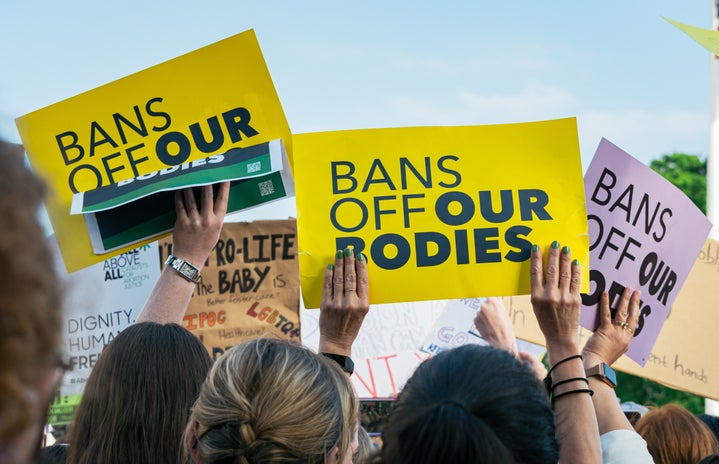TW: This article discusses abortion and miscarriage. If you are uncomfortable with these topics, maybe don’t read this.
October 28th marked 10 years since the death of Savita Halappanavar. Savita was a dentist, originally from India, who died in University Hospital Galway. Savita was pregnant at the time, and had presented at the hospital with back pain. She was 17 weeks pregnant at the time, but no diagnosis was given. However, Savita returned later, and doctors found that the gestational sac was protruding from her body. Doctors in the hospital confirmed miscarriage would be inevitable. Sometime later, her waters broke but her body did not expel the fetus.
After discussing the possibility of an abortion, doctors refused on the grounds of Irish law. Savita later developed sepsis, and suffered a cardiac arrest in the early hours of the 28th of October aged 31.
To say Savita’s death outraged the nation would be a gross understatement. The local community in Galway took to the streets in protest. Savita had been a founding organiser of the Diwali festival in Galway, which was cancelled that year.
The 14th of November, the day after the announcement of her death saw more than 2,000 people gather in her honour at the Dáil. Ireland is a nation who doesn’t take things sitting down, and vigils and protests happened across the nation, including a march of between 10,000 and 12,000 people from Parnell Square to Merrion Square.
Ireland has always had a rocky relationship with abortion care and reproductive rights. This is wholly due to the grasp of the Catholic church on the nation. The law which refused Ms. Halappanavar the care she needed came into effect while Ireland was still under control of the British in 1861, who stated that it was unlawful to procure a miscarriage.
Since then, abortion in Ireland has been all but denied. There are only a few minor exceptions to the rule. Only when the mothers life is at immediate risk can an abortion be considered, an exception which came after the ‘X case’ in 1999. In simple terms, until a few years ago, Ireland equated the life of an unborn fetus with the life of its mother, and would be more inclined to save the unborn fetus rather than the mother. This came to be in the Eighth Amendment of the Constitution, which holds the life of the mother and unborn child to equal status. In 1983 it was attempted to be overturned but considering divorce was still illegal till the mid 90’s, Ireland remained staunchly in the grips of the Catholic church, and the past.
Over the years protests and Marches for Life kept happening. Irish people were pushing back against the laws of the past as a new age of Irish people came to be. For a while it seemed like nothing was going to come from the protests, that we’d be stuck in 1950’s Ireland forever, but eventually the atmosphere and attitudes of people started to shift. Then came 2018. The year everything changed for the better. Ireland held a referendum. The referendum was to permit the Oireachtas to legislate abortion, decriminalising it. The bill passed through the two houses by 27th March and the referendum was held on the 25th May.
The next morning, Ireland was a new country. No longer under complete control of the Catholic church, the referendum had been won 66 percent to 30 percent. A new era for women and reproductive healthcare.
While we did manage to successfully implement change in Ireland and see abortion care legalised, the result has not seen the right amount of new laws. While an abortion is allowed, there is a limit on how far into pregnancy an abortion can be sought. As well as that, the person obtaining the abortion is obliged to make an appointment, wait 3 days as a waiting period and then travel for a termination. Another problem comes in the form of some hospitals not performing terminations. Those are some of the roadblocks still standing in the way of proper healthcare for women and people with uteruses.
Another incredibly important thing to mention when we discuss abortion care in general is the US, who are going through huge social changes. In the last year we have seen Roe v Wade overturned, a law that supported women and people with uteruses and protected them, offering them the healthcare they deserve. As a result of the law being overturned, this gave each state the power to do whatever they saw fit. A lot of states took the stance Ireland once held – that abortion is wrong.
In a number of states in America, obtaining an abortion is now a very serious crime, punishable with time in prison. In extremely backward states, like Texas, the law is so extreme that even if a young girl were to get a termination after being raped, she is still liable to face charges.
The reality of the new law changes in America is horrifying. Only a few short years ago we were in a similar state. Punishment of up to 14 years was a sentence women and people risked facing if caught smuggling abortion pills into the country. This is the reality of it, and why the march for choice is so important, and why, even though we successfully repealed the 8th Amendment and gave Savita Halappanavar a legacy we hope she is proud of, there is still more work to be done. The march goes on.


